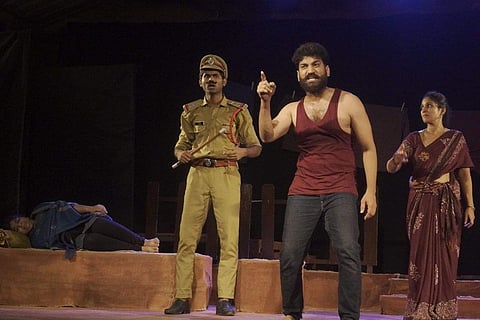
- LIFESTYLE
- FASHION
- FOOD
- ENTERTAINMENT
- EVENTS
- CULTURE
- VIDEOS
- WEB STORIES
- GALLERIES
- GADGETS
- CAR & BIKE
- SOCIETY
- TRAVEL
- NORTH EAST
- INDULGE CONNECT

If you find yourself intrigued by social dramas centred around strong ideologies, Dochevarevarura being staged by city - based Bhoomika Theatre is a compelling choice worth considering. It’s a Telugu adaptation of Italian playwright and actor Dario Fo’s Can’t Pay, Won’t Pay. The play is known for its sharp social commentary and biting humour.
The plot underlines the plight of ordinary working class individuals struggling to make ends meet. As the story unfolds, a group of women, who seem fed up with the hike in prices of basic commodities, decide to engage in a form of civil disobedience by refusing to pay for their groceries and other things.
Dochevarevarura, directed by Rajeev Ranjan, is adapted into Telugu by G Samyuktha and A Mohana. In this version, two women — Lalita and Lakshmi — start buying things from the supermarket without paying the money. However, their spouses are known for their impeccable moral character, upholding principles of honesty and integrity with unwavering commitment. Therefore, in an attempt to conceal their actions from their morally upright husbands, the two women unwittingly plunge into a series of unforeseen circumstances.
Rajeev explains, “Dochevarevarura depicts the transformation of the middle class, highlighting the idea that regardless of how oblivious one might become, a moment inevitably arises when you have to participate in a revolution.” Discussing why this play written in 1974 is still relevant, he says, “The roles of the media or bureaucrats (policymakers) for that matter and other authorities, are undergoing profound change in India these days. Having said that, in a democracy, the bedrock of belief lies in its people, and it is imperative to maintain faith in them. Throughout history, Indians have played pivotal roles in various revolutions aimed at ushering in significant change.”
Theatre artiste Raavan Reddy Nitturu, who will be seen playing Govind (Lakshmi’s husband), tells us, “It was a daunting task to step into Govind’s shoes and view the world through his lens of exceptionally high moral standards. The reality is that, no matter how steadfast our moral principles may be, there are moments in life when we all are tempted to take shortcuts or bend rules.” He agrees that the portrayal of Govind remains an ongoing journey of exploration.
Passionate about theatre, Vijaya Krishna, who is essaying the role of Lakshmi, brings some good experience from her work in advertising films. She says, “Acting in front of the camera and performing on stage are two extremely different things. The former involves cuts and retakes, while theatre demands an immersive journey.”
The director’s work predominantly revolves around themes of social change, and the crucial role of individuals in contributing to transformative change in society. Highly driven by these ideas, Rajeev says, “The essence of theatre transcends the role of teaching or preaching to the audience. Instead, it is about stirring the depths of human consciousness by posing critical questions that linger in the minds of the viewers. Theatre serves as a catalyst, encouraging individuals to broaden their perspectives and empowering them to express their thoughts openly and speak up or question.”
“As a director, the intention is not to dictate what is right or wrong, but rather to facilitate an environment where individuals can question, explore, and ultimately construct their own beliefs and viewpoints,” Rajeev adds.
Free entry. September 30, 7 pm.
At Sundarayya Vignana Kendram (SVK), Gachibowli.
Mail ID: sakshisuresh.k@newindianexpress.com
Twitter: @kaithwas_sakshi